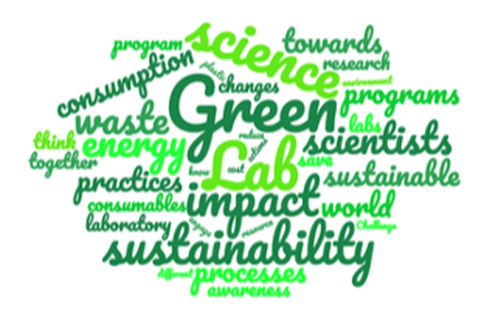|
Words by: Lucie Yammine Edited by: Marta Collu and Laurie Herviou To celebrate Earth Day during the month of April, INet-NYC has decided to partner up with My Green Lab® to raise awareness about energy consumption in our labs and to work together towards a more sustainable approach of science. My Green Lab® is a US based non profit organization that works with labs all over the world. Their goal is to bring awareness to the environmental impact of laboratory operations and share best practices to make changes that lead to science sustainability. Together with our guest speaker Christina Greever, Sustainability Program Manager at My Green Lab®, Dr Marta Collu and myself hosted a webinar about laboratory sustainability and Green Labs movements you can watch or rewatch on our YouTube channel. Reducing the environmental impact of research has not only interested researchers in the NYC area or the US, but also around the globe. We were very pleased to count among our attendees, scientists from Australia, Canada, Colombia, India and the UK! When we think about waste in a lab environment we tend to only think about single use plastic consumables and packaging, and forget about the energy consumption and the amount of water used in our lab processes. Therefore, Christina walked us through the impact of our research, using very specific and striking examples. Did you know that one Ultra Low Temperature (ULT) Freezer consumes as much energy as one average US household per year? And chilling it up to -70°C instead of -80°C can save as much as 30% of the consumed energy. *Laboratories discard 2% of the global plastic consumption* According to Christina, Science is one of the final frontier of sustainability, because every lab is as complex as the research that is conducted. But sustainability can be reached in scientific processes in a lot of different ways. We do know that science is very resource intensive, then how can we combat this excess resource use? There are more and more institutions-based green lab programs growing around the world. There is interest and leadership towards sustainability coming not only from universities but also from industry and companies that are committing to greening their manufacturing processes. “You are not alone in caring about reducing the environmental impact of science” A few easy steps to get started:
We can also reduce waste with green chemistry, and your lab doesn’t have to be a chemistry lab to follow the 12 principles of green chemistry! Beyond Benign is an organization that focuses on these lab practices. “Green chemistry is the design of chemical products and processes that reduce and/or eliminate the use or generation of hazardous substances. This approach requires an open and interdisciplinary view of material and product design, applying the principle that it is better to consider waste and hazard prevention options during the design and development phase, rather than disposing, treating and handling waste and hazardous chemicals after a process or material has been developed.” When we are at home, turning off lights after leaving a room or running dishwashers when they are full seem like a non-brainer. The simplest actions can have a big impact on the environmental cost of a lab in terms of energy consumption, because they have a much bigger impact in our labs than we can imagine. “If every lab turned off one piece of equipment over night, it could save the equivalent of taking over 10,000 cars off the road.” Among the best practices Christina listed, she also gave the examples of shutting the chemical hood sash to save two average US households worth of energy, defrosting and removing ice for our cold storage for them to operate at maximum efficiency. To support scientists in their quest towards best practices, Christina said that My Green Lab has launched different programs designed so that individuals, laboratories, institutions, suppliers can interact and engage together to transform how science is done around the world. Here are a few of them:
Using this label, as scientists and purchasers, we can standardly compare and choose the most sustainable and eco-friendly products.
In summary, the smallest changes in our daily work life can have a massive impact on our environmental cost. “You cannot get through a single day without having an impact on the world around you. What you do makes a difference, and you have to decide what kind of difference you want to make.”
-Jane Goodall-
0 Comments
Words by Lucie Yammine Edited by Laurie Herviou, Conchi Izquierdo and Rinki Saha A few cliches about scientists are that we constantly think about science, always buried in some obscure book with formulas that only us can understand or mixing colorful solutions and exploding chemicals. While this might be an exaggeration - to some extent, we do think science, see science and talk science. Then, why wouldn’t we listen to science too? What do you listen to when you are seated in front of your computer analyzing excel spreadsheets, when you are coding or when you are at your bench doing experiments? Is it the same playlist that you always listen to? Why don’t you try listening to some podcasts! Depending on the length of the episodes you’d prefer, you could try one or the others in this list. Although not exhaustive, this list could help you get started. Although many podcasts are available, their subjects are not always as broad as the ones in this list, but maybe you can find a good fit for you elsewhere. If you are interested in astronomy, you should know that NASA has different podcasts, among which the appraised Houston We Have a Podcast. If you are more of an animal lover, you could give Creature Features a try. What about your interest in human behavior? Well, NPR’s podcast Invisiblia is one I would recommend listening to. Without further ado, here are my top 3 science related podcasts, that you can find on most podcasts hosting platforms.  This podcast is a big mix of different topics. You can learn about anything without any prior knowledge on the subject. Because all-ologies are beautiful from archaeology, ecology, neurology to psychology; so choose your topic and learn more about it. The host, Alie Ward, invites specialists to discuss science and makes asides to explain in simpler words some technical terms, which makes it accessible whatever your scientific level is. Most episodes are over an hour long to deeply dive into these-ologies. If you’ve ever wondered how many babies can mom scorpios have, you can check the Scorpiology episode, and go from there! Credits: www.alieward.com  The show is based on using scientific facts to battle or to confirm myths and trending subjects. Not surprising that a lot of the latest episodes are coronavirus related but with 9 seasons and hundreds of episodes, you will definitely find some subjects of interest! The episodes are roughly 30 minutes long, and the host Wendy Zukerman's jovial voice makes them easy to listen to when you just need a little pinch of science. Personal choices to try out are Race: Can We See It In Our DNA or Chiropractors. Credits: www.grimletmedia.com  It is said that taking a step back from your work for a minute can help you get your ideas in order. What about listening to unrelated science during that minute? That might help clear your mind with a two or three minutes long podcast. Take a look at the hundreds of podcasts in this series or learn more about how Flamingos Can Be Picky about Company or how Mars-Quakes, Could Reveal How Mars Was Built here. Credits: www.podcasts.apple.com If you need any more science in your life, I hope these suggestions will nurture your curiosity. Or maybe you are outraged that one of your favorite podcasts didn’t make it into my short-list, tell me more!
|
Archives
May 2025
Categories
All
|



 RSS Feed
RSS Feed